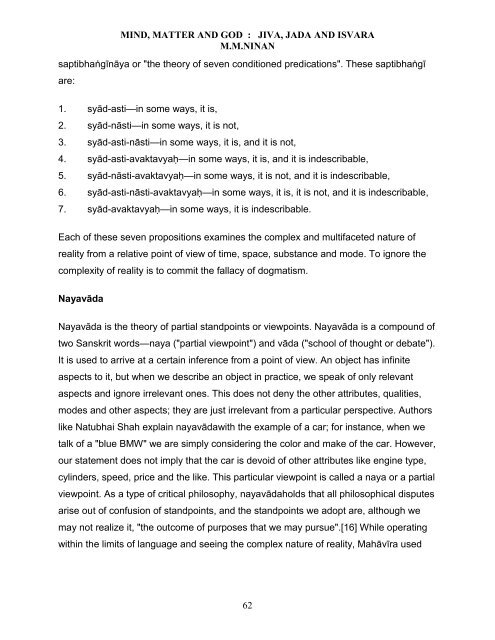Jiva
Create successful ePaper yourself
Turn your PDF publications into a flip-book with our unique Google optimized e-Paper software.
MIND, MATTER AND GOD : JIVA, JADA AND ISVARA<br />
M.M.NINAN<br />
saptibhaṅgīnāya or "the theory of seven conditioned predications". These saptibhaṅgī<br />
are:<br />
1. syād-asti—in some ways, it is,<br />
2. syād-nāsti—in some ways, it is not,<br />
3. syād-asti-nāsti—in some ways, it is, and it is not,<br />
4. syād-asti-avaktavyaḥ—in some ways, it is, and it is indescribable,<br />
5. syād-nāsti-avaktavyaḥ—in some ways, it is not, and it is indescribable,<br />
6. syād-asti-nāsti-avaktavyaḥ—in some ways, it is, it is not, and it is indescribable,<br />
7. syād-avaktavyaḥ—in some ways, it is indescribable.<br />
Each of these seven propositions examines the complex and multifaceted nature of<br />
reality from a relative point of view of time, space, substance and mode. To ignore the<br />
complexity of reality is to commit the fallacy of dogmatism.<br />
Nayavāda<br />
Nayavāda is the theory of partial standpoints or viewpoints. Nayavāda is a compound of<br />
two Sanskrit words—naya ("partial viewpoint") and vāda ("school of thought or debate").<br />
It is used to arrive at a certain inference from a point of view. An object has infinite<br />
aspects to it, but when we describe an object in practice, we speak of only relevant<br />
aspects and ignore irrelevant ones. This does not deny the other attributes, qualities,<br />
modes and other aspects; they are just irrelevant from a particular perspective. Authors<br />
like Natubhai Shah explain nayavādawith the example of a car; for instance, when we<br />
talk of a "blue BMW" we are simply considering the color and make of the car. However,<br />
our statement does not imply that the car is devoid of other attributes like engine type,<br />
cylinders, speed, price and the like. This particular viewpoint is called a naya or a partial<br />
viewpoint. As a type of critical philosophy, nayavādaholds that all philosophical disputes<br />
arise out of confusion of standpoints, and the standpoints we adopt are, although we<br />
may not realize it, "the outcome of purposes that we may pursue".[16] While operating<br />
within the limits of language and seeing the complex nature of reality, Mahāvīra used<br />
62


















